28 nov 2014
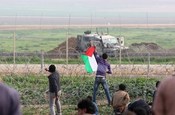
Israeli occupation forces (IOF) fired at and wounded a Palestinian youth in northern Gaza on Friday night.
Dr. Ashraf al-Qidra, the health ministry spokesman, said on his Facebook page that a young man in his twenties was hit with a bullet in his thigh in eastern Jabalia.
He said that an ambulance carried the youth to hospital in Beit Lahia for medical treatment.
IOF soldiers almost daily raid borders areas in Gaza amidst random shooting and bulldozing of cultivated land in violation of the truce agreement signed in Cairo on 28 August.
Dr. Ashraf al-Qidra, the health ministry spokesman, said on his Facebook page that a young man in his twenties was hit with a bullet in his thigh in eastern Jabalia.
He said that an ambulance carried the youth to hospital in Beit Lahia for medical treatment.
IOF soldiers almost daily raid borders areas in Gaza amidst random shooting and bulldozing of cultivated land in violation of the truce agreement signed in Cairo on 28 August.
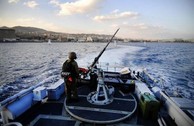
Navy targets Gaza fishermen
Israeli forces deployed along the border of the southern Gaza Strip were reported to have opened fired at Palestinian homes and properties in the area, on Friday morning, according to witnesses. In the northwest of Gaza, forces have again fired on Palestinian fishermen.
Soldiers near the Kissufim military base opened fire east of al-Qarrara, located north of Khan Younis, twice early Friday, once after midnight and again later in the morning, witnesses told Ma'an News Agency.
They said the attacks were aimed at Palestinian homes in the area, but that no injuries were reported.
The incident came only hours after Israeli forces fired a tank shell into the Gaza Strip, on Thursday, under the claim that shots had been fired at an Israeli military vehicle near the border.
Although the shell caused no reported injuries, it marked the most serious escalation on the Gaza border since the end of this past summer's conflict in the region that left nearly 2,200 Palestinians dead and over 11,000 injured, the vast majority of them civilians.
Ma'an further reports that, while Hamas has largely abided by the terms of the ceasefire and prevented any rocket fire into Israel, Israeli authorities have been slow to carry out their responsibilities according to the ceasefire, particularly in easing the eight-year old siege on the Gaza Strip.
Israeli forces have repeatedly violated the ceasefire by firing at Palestinians inside Gaza near the border fence as well as at sea, killing one on land and damaging numerous fishing boats.
Fadil Muhammad Halawah, 32, was shot dead on Sunday while hunting birds east of Jabaliya. He was the first Palestinian to be killed by Israeli forces in the Gaza Strip since the signing of the ceasefire. Israeli occupation military boats showered Palestinian fishing boats with machine gun fire, Friday, off As-Sudaneyya shore northwest of Gaza Strip.
It was reported that random fire shots were heard in the area before it was found out that the shots were targeting small rowing boats. No casualties were reported.
Israeli forces deployed along the border of the southern Gaza Strip were reported to have opened fired at Palestinian homes and properties in the area, on Friday morning, according to witnesses. In the northwest of Gaza, forces have again fired on Palestinian fishermen.
Soldiers near the Kissufim military base opened fire east of al-Qarrara, located north of Khan Younis, twice early Friday, once after midnight and again later in the morning, witnesses told Ma'an News Agency.
They said the attacks were aimed at Palestinian homes in the area, but that no injuries were reported.
The incident came only hours after Israeli forces fired a tank shell into the Gaza Strip, on Thursday, under the claim that shots had been fired at an Israeli military vehicle near the border.
Although the shell caused no reported injuries, it marked the most serious escalation on the Gaza border since the end of this past summer's conflict in the region that left nearly 2,200 Palestinians dead and over 11,000 injured, the vast majority of them civilians.
Ma'an further reports that, while Hamas has largely abided by the terms of the ceasefire and prevented any rocket fire into Israel, Israeli authorities have been slow to carry out their responsibilities according to the ceasefire, particularly in easing the eight-year old siege on the Gaza Strip.
Israeli forces have repeatedly violated the ceasefire by firing at Palestinians inside Gaza near the border fence as well as at sea, killing one on land and damaging numerous fishing boats.
Fadil Muhammad Halawah, 32, was shot dead on Sunday while hunting birds east of Jabaliya. He was the first Palestinian to be killed by Israeli forces in the Gaza Strip since the signing of the ceasefire. Israeli occupation military boats showered Palestinian fishing boats with machine gun fire, Friday, off As-Sudaneyya shore northwest of Gaza Strip.
It was reported that random fire shots were heard in the area before it was found out that the shots were targeting small rowing boats. No casualties were reported.
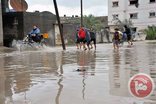
Israel allows 300 trucks through Karam Abu Salem
UN Palestinian refugee agency UNRWA declared, on Thursday, a state of emergency in Gaza City, due to massive rains and flooding.
Ma'an News Agency reports that a major storm, over the past week, has filled the streets of Gaza City with water and sewage, causing further misery for more than 100,000 Palestinians who remain homeless as a result of Israel's crippling military assault on the region, this past summer.
In a public statement, UNRWA informed that 63 schools across Gaza City and 43 schools across the Northern Gaza Strip had been closed Thursday, as a result of the flooding. Hundreds of residents in the Sheikh Radwan neighborhood have also been evacuated.
"The flooding is exacerbating the already dire humanitarian situation in Gaza caused by blockade and the unprecedented destruction from the latest Israeli offensive," the agency posted on Facebook.
Ma'an further reports that Gaza is prone to severe flooding and that, in early December, 2013, heavy rains led to the displacement of at least 40,000 people. Any flooding is exacerbated by a chronic lack of fuel which limits how much water can be pumped out of flood-stricken areas.
The fuel shortages are a result of the eight-year-old Israeli siege, which also limits the import of related machinery that could help Gazans to combat the floods.
In response, UNRWA has additionally declared 60,000 liters of emergency fuel to be provided to pumping stations in Gaza.
-- --
Furthermore, head of the Coordination Committee for entry of goods in the Gaza Strip, Raed Fattouh, stated that Israeli authorities have allowed the entry of 300 trucks into the region, via Karam Abu Salem crossing, on Thursday.
According to a report by Al Ray Palestinian Media Agency, the trucks are loaded with goods for the commercial, agricultural, aid and transportation sectors.
Mr. Fattouh also noted that 100 trucks of gravel will enter for the infrastructure of roads for the Qatari projects. In addition to a quantity of industrial diesel for Gaza's only power plant, transportation fuel and cooking gas will also be pumped through the terminal.
Karam Abu Salem is the only commercial crossing through which goods and fuel can enter the Gaza Strip, and Israeli authorities close it on Friday and Saturday of each week.
-- --
Thursday marks the fourth straight day of unusually heavy rains across the region, causing temperatures to drop across Palestine.
The occupied West Bank is also experiencing flooding as a result of the storm, with difficult driving conditions reported in the hillier villages and cities.
Rains are expected to end by Friday morning, with temperatures to rise, as well.
UN Palestinian refugee agency UNRWA declared, on Thursday, a state of emergency in Gaza City, due to massive rains and flooding.
Ma'an News Agency reports that a major storm, over the past week, has filled the streets of Gaza City with water and sewage, causing further misery for more than 100,000 Palestinians who remain homeless as a result of Israel's crippling military assault on the region, this past summer.
In a public statement, UNRWA informed that 63 schools across Gaza City and 43 schools across the Northern Gaza Strip had been closed Thursday, as a result of the flooding. Hundreds of residents in the Sheikh Radwan neighborhood have also been evacuated.
"The flooding is exacerbating the already dire humanitarian situation in Gaza caused by blockade and the unprecedented destruction from the latest Israeli offensive," the agency posted on Facebook.
Ma'an further reports that Gaza is prone to severe flooding and that, in early December, 2013, heavy rains led to the displacement of at least 40,000 people. Any flooding is exacerbated by a chronic lack of fuel which limits how much water can be pumped out of flood-stricken areas.
The fuel shortages are a result of the eight-year-old Israeli siege, which also limits the import of related machinery that could help Gazans to combat the floods.
In response, UNRWA has additionally declared 60,000 liters of emergency fuel to be provided to pumping stations in Gaza.
-- --
Furthermore, head of the Coordination Committee for entry of goods in the Gaza Strip, Raed Fattouh, stated that Israeli authorities have allowed the entry of 300 trucks into the region, via Karam Abu Salem crossing, on Thursday.
According to a report by Al Ray Palestinian Media Agency, the trucks are loaded with goods for the commercial, agricultural, aid and transportation sectors.
Mr. Fattouh also noted that 100 trucks of gravel will enter for the infrastructure of roads for the Qatari projects. In addition to a quantity of industrial diesel for Gaza's only power plant, transportation fuel and cooking gas will also be pumped through the terminal.
Karam Abu Salem is the only commercial crossing through which goods and fuel can enter the Gaza Strip, and Israeli authorities close it on Friday and Saturday of each week.
-- --
Thursday marks the fourth straight day of unusually heavy rains across the region, causing temperatures to drop across Palestine.
The occupied West Bank is also experiencing flooding as a result of the storm, with difficult driving conditions reported in the hillier villages and cities.
Rains are expected to end by Friday morning, with temperatures to rise, as well.
26 nov 2014
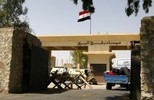
Gaza Ministry of Agriculture halts import of Israeli fruit
Egyptian authorities will open the Rafah border crossing with the Gaza Strip to allow thousands of Palestinians, stranded for weeks on the Egyptian side, to return home, an official stated on Wednesday. Additionally, Gaza's Ministry of Agriculture has imposed a ban on the import of Israeli fruit.
Nathmi Muhanna, director of Palestinian crossings and borders, told Ma'an News Agency that Rafah would be open on Wednesday from 4:00 p.m. to 7:00 p.m. and on Thursday from 7:00 a.m. to 4:00 p.m.
The Palestinian ambassador to Egypt, Jamal al-Shubki, confirmed that he had received word from Egyptian leadership that the crossing would indeed be opened.
The crossing was closed in late October following an attack on Egyptian soldiers in the Sinai desert, resulting in the deaths of 30 soldiers.
Related info: 10/31/14 Egypt to Build Gaza Buffer Zone, Thousands to Be Displaced
PNN further reports that the crossing is the only non-Israeli access point to the Palestinian territory, and that terminal was operating in only one direction – allowing people in but not out.
Rafah crossing is the principal connection between Gaza's 1.7 million people and the outside world, but Egypt tends to keep it closed, as part of the jointly-enforced Israeli blockade on the region.
The closure of the crossing has prevented thousands of Gazans from accessing medical treatment or higher education in Egypt and beyond, the United Nations Office for the Coordination of Humanitarian Affairs said in its latest report.
-- --
In related news, Gaza's Ministry of Agriculture announced, on Wednesday, that it will stop importing Israeli fruit into the besieged enclave after Israeli authorities prevented vegetables from Gaza from entering the West Bank, at Kerm Shalom crossing.
The ban caused Palestinian farmers huge financial losses and will lead to a decrease in prices of vegetables in Gaza, the Ministry said at the time.
"We decided to stop importing fruits from the Israeli side to pressure Israel to resume allowing our vegetables to be exported," Tahsin Wal-Saqqa, general manager of marketing and crossings in the Ministry, told Ma'an.
In early November, Israel allowed the export of agricultural products from Gaza to the West Bank for the first time since 2007.
Before the siege was imposed on Gaza following the Palestinian political division of 2007, Gaza exported fruits, vegetables, flowers, fish, and products to the West Bank.
Israel agreed to ease the siege on Gaza as part of the recent ceasefire agreement that ended a devastating Israeli military offensive on Gaza, this past summer but, so far, no integral steps have been taken to lessen restrictions.
Egyptian authorities will open the Rafah border crossing with the Gaza Strip to allow thousands of Palestinians, stranded for weeks on the Egyptian side, to return home, an official stated on Wednesday. Additionally, Gaza's Ministry of Agriculture has imposed a ban on the import of Israeli fruit.
Nathmi Muhanna, director of Palestinian crossings and borders, told Ma'an News Agency that Rafah would be open on Wednesday from 4:00 p.m. to 7:00 p.m. and on Thursday from 7:00 a.m. to 4:00 p.m.
The Palestinian ambassador to Egypt, Jamal al-Shubki, confirmed that he had received word from Egyptian leadership that the crossing would indeed be opened.
The crossing was closed in late October following an attack on Egyptian soldiers in the Sinai desert, resulting in the deaths of 30 soldiers.
Related info: 10/31/14 Egypt to Build Gaza Buffer Zone, Thousands to Be Displaced
PNN further reports that the crossing is the only non-Israeli access point to the Palestinian territory, and that terminal was operating in only one direction – allowing people in but not out.
Rafah crossing is the principal connection between Gaza's 1.7 million people and the outside world, but Egypt tends to keep it closed, as part of the jointly-enforced Israeli blockade on the region.
The closure of the crossing has prevented thousands of Gazans from accessing medical treatment or higher education in Egypt and beyond, the United Nations Office for the Coordination of Humanitarian Affairs said in its latest report.
-- --
In related news, Gaza's Ministry of Agriculture announced, on Wednesday, that it will stop importing Israeli fruit into the besieged enclave after Israeli authorities prevented vegetables from Gaza from entering the West Bank, at Kerm Shalom crossing.
The ban caused Palestinian farmers huge financial losses and will lead to a decrease in prices of vegetables in Gaza, the Ministry said at the time.
"We decided to stop importing fruits from the Israeli side to pressure Israel to resume allowing our vegetables to be exported," Tahsin Wal-Saqqa, general manager of marketing and crossings in the Ministry, told Ma'an.
In early November, Israel allowed the export of agricultural products from Gaza to the West Bank for the first time since 2007.
Before the siege was imposed on Gaza following the Palestinian political division of 2007, Gaza exported fruits, vegetables, flowers, fish, and products to the West Bank.
Israel agreed to ease the siege on Gaza as part of the recent ceasefire agreement that ended a devastating Israeli military offensive on Gaza, this past summer but, so far, no integral steps have been taken to lessen restrictions.
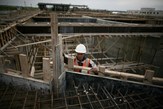
The private sector coordination council in Gaza on Tuesday called for unconditionally lifting the Gaza siege and unblocking all border-crossings so as to smooth goods and passengers’ access out of and into the Strip.
Palestinian businessman and member of the council’s administrative board, Faysal al-Shawa, said in a press conference in Gaza Tuesday the UN special envoy Robert Serry’s plan stands as a stumbling block before the reconstruction process and the entry of rebuilding materials into the Strip.
Al-Shawa called on the United Nations to take up its responsibility vis-à-vis the rehabilitation process and provide shelter for the homeless Palestinian families by offering bids for local contractors, as had been the case during the pre-offensive period.
He further appealed to the international community to back up the rehabilitation of Gaza and take serious action against Israel’s obstruction of the rebuilding process.
In a related development, independent MP Jamal al-Khudari on Tuesday acclaimed recent UN calls, launched by the President of the UN General Assembly, Sam Kutesa, to urgently lift the Gaza Siege.
Kutesa on Monday called for lifting the Gaza blockade, dubbing the humanitarian state of affairs in the Strip quite tragic.
Kutesa’s appeals came during a special meeting of the Committee on the Exercise of the Inalienable Rights of the Palestinian People held Monday morning at the UN Headquarters in New York to mark the observance of the International Day of Solidarity with the Palestinian People.
MP al-Khudari called for putting into effect Kutesa’s appeals and step up pressure on Israel to lift the siege, open the crossings, and halt its Judaization plots in Occupied Jerusalem and the West Bank.
Palestinian businessman and member of the council’s administrative board, Faysal al-Shawa, said in a press conference in Gaza Tuesday the UN special envoy Robert Serry’s plan stands as a stumbling block before the reconstruction process and the entry of rebuilding materials into the Strip.
Al-Shawa called on the United Nations to take up its responsibility vis-à-vis the rehabilitation process and provide shelter for the homeless Palestinian families by offering bids for local contractors, as had been the case during the pre-offensive period.
He further appealed to the international community to back up the rehabilitation of Gaza and take serious action against Israel’s obstruction of the rebuilding process.
In a related development, independent MP Jamal al-Khudari on Tuesday acclaimed recent UN calls, launched by the President of the UN General Assembly, Sam Kutesa, to urgently lift the Gaza Siege.
Kutesa on Monday called for lifting the Gaza blockade, dubbing the humanitarian state of affairs in the Strip quite tragic.
Kutesa’s appeals came during a special meeting of the Committee on the Exercise of the Inalienable Rights of the Palestinian People held Monday morning at the UN Headquarters in New York to mark the observance of the International Day of Solidarity with the Palestinian People.
MP al-Khudari called for putting into effect Kutesa’s appeals and step up pressure on Israel to lift the siege, open the crossings, and halt its Judaization plots in Occupied Jerusalem and the West Bank.

The British government stated, on Monday, that it will review arms export licenses to Israel, to ensure that the use of such weapons does not contravene international law.
Britain reviewed, in August, all arms export licenses to Israel after the recent military assault on Gaza, announcing that it will halt 12 arms export licenses to Israel if military operations in Gaza are resumed.
According to Al Ray, the new reviews come following recent reports of a Palestinian killed by Israeli soldiers, near the border fence, in the Gaza Strip.
A spokesperson for Britain claimed that the August reviews reflect that most licensed exports to Israel do not includes materials used in the Gaza assault.
Furthermore, in July, a British parliamentary committee issued a report stating that the outstanding contracts approved by the government include export of dual-use or military goods to Israel. It estimated the cost of these goods up to 7.8 billion pounds (US $ 12.3 billion), and includes contracts to provide body armor components, unmanned aircraft and missile parts to Israel.
A group called "Campaign against the Arms Trade" recently published an analysis which shows that Britain had approved military licenses to Israel worth 7 million pounds, just six months prior to the war on Gaza.
The government says that it does not cast doubt on the figure.
Britain reviewed, in August, all arms export licenses to Israel after the recent military assault on Gaza, announcing that it will halt 12 arms export licenses to Israel if military operations in Gaza are resumed.
According to Al Ray, the new reviews come following recent reports of a Palestinian killed by Israeli soldiers, near the border fence, in the Gaza Strip.
A spokesperson for Britain claimed that the August reviews reflect that most licensed exports to Israel do not includes materials used in the Gaza assault.
Furthermore, in July, a British parliamentary committee issued a report stating that the outstanding contracts approved by the government include export of dual-use or military goods to Israel. It estimated the cost of these goods up to 7.8 billion pounds (US $ 12.3 billion), and includes contracts to provide body armor components, unmanned aircraft and missile parts to Israel.
A group called "Campaign against the Arms Trade" recently published an analysis which shows that Britain had approved military licenses to Israel worth 7 million pounds, just six months prior to the war on Gaza.
The government says that it does not cast doubt on the figure.
25 nov 2014
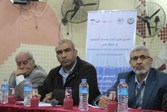
Mayor of Rafah city, Subhi Abu Radwan, said Israel’s tightening of the Gaza siege and its latest offensive on the Strip deprived Rafah from a cluster of rehabilitation projects and hit the city’s infrastructure with a deadly blow.
The Mayor’s statement came during a hearing held Monday by the Rafah Municipality, in cooperation with the Palestinian Center for Peace and Democracy, and sponsored by the German Committee for Cooperation and Development. The hearing took place in the presence of head of the Rafah-based UNRWA office, Youssef Mousa.
Abu Radwan said the municipality’s revenues shrunk back as much as 46% over the previous couple of years.
The rate of people committed to paying the municipality bills does not exceed 5%, which has exacerbated even further the salary crisis and trimmed down the budget allotted for rehabilitation projects, he further charged.
In another development, the Palestinian Minister of Housing and Public Works, Mufeed al-Hasayna, and the Qatari Red Crescent signed a memorandum pledging to build 100 mobile housing units to the casualties of the latest Israeli offensive on Gaza. The initiative is sponsored by the Maldivian government.
Al-Hasayna hailed the state of Qatar and the Maldivian authorities for their continuous back-up to the Palestinian people.
“These initiatives come as part of attempts at toning down the agony of the Palestinian people, especially with the advent of the winter season,” the minister said.
The Palestinian official quoted representatives of Robert Serry’s office and the UNOPS foundation as pledging to dispatch the needed reconstruction materials to some 24,000 homeless Palestinians.
He attributed his optimism regarding the reconstruction process to Qatar’s pledges to dispatch a $200-million-emergency-cash-batch to the Gaza Strip.
Al-Hasayna further acclaimed the role played by the UN Peace Envoy to the Middle East, Robert Serry, in pressing ahead with the reconstruction process.
The Mayor’s statement came during a hearing held Monday by the Rafah Municipality, in cooperation with the Palestinian Center for Peace and Democracy, and sponsored by the German Committee for Cooperation and Development. The hearing took place in the presence of head of the Rafah-based UNRWA office, Youssef Mousa.
Abu Radwan said the municipality’s revenues shrunk back as much as 46% over the previous couple of years.
The rate of people committed to paying the municipality bills does not exceed 5%, which has exacerbated even further the salary crisis and trimmed down the budget allotted for rehabilitation projects, he further charged.
In another development, the Palestinian Minister of Housing and Public Works, Mufeed al-Hasayna, and the Qatari Red Crescent signed a memorandum pledging to build 100 mobile housing units to the casualties of the latest Israeli offensive on Gaza. The initiative is sponsored by the Maldivian government.
Al-Hasayna hailed the state of Qatar and the Maldivian authorities for their continuous back-up to the Palestinian people.
“These initiatives come as part of attempts at toning down the agony of the Palestinian people, especially with the advent of the winter season,” the minister said.
The Palestinian official quoted representatives of Robert Serry’s office and the UNOPS foundation as pledging to dispatch the needed reconstruction materials to some 24,000 homeless Palestinians.
He attributed his optimism regarding the reconstruction process to Qatar’s pledges to dispatch a $200-million-emergency-cash-batch to the Gaza Strip.
Al-Hasayna further acclaimed the role played by the UN Peace Envoy to the Middle East, Robert Serry, in pressing ahead with the reconstruction process.
24 nov 2014
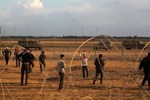
The Israeli Occupation forces (IOF) opened heavy fire Sunday evening at Palestinian citizens near the border fence east of Rafah southern Gaza Strip.
The 17-year-old minor Abdel Razek Qadhi suffered moderate injuries during the gunfire attack and was transferred to the local hospital in the city, Palestinian media sources reported.
The sources pointed out that two other citizens were arrested during the incident.
Earlier Sunday, 32-year-old Mohamed Halaweh was shot and killed by Israeli gunfire in Jabalia to the north of Gaza Strip in flagrant violation of the ceasefire agreement reached on August 26.
The 17-year-old minor Abdel Razek Qadhi suffered moderate injuries during the gunfire attack and was transferred to the local hospital in the city, Palestinian media sources reported.
The sources pointed out that two other citizens were arrested during the incident.
Earlier Sunday, 32-year-old Mohamed Halaweh was shot and killed by Israeli gunfire in Jabalia to the north of Gaza Strip in flagrant violation of the ceasefire agreement reached on August 26.
23 nov 2014
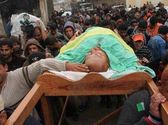
Fadel Mohammad Halawa 32
Palestinian medical sources have reported that a man was shot and killed by Israeli army fire, east of Jabalia, in the northern part of the Gaza Strip on Sunday. In addition, a Palestinian teen was shot and wounded by army fire in Rafah, southern Gaza.
Dr. Ashraf Al-Qedra, spokesperson of the Ministry of Health in Gaza, said the slain Palestinian is a famer who was working in his land close to the border fence.
He added that the 32-year-old Palestinian, identified as Fadel Mohammad Halawa, was shot in his back, and that the bullet exited through his abdomen. His body was moved to the Kamal ‘Adwan Hospital in Jabalia.
Eyewitnesses said that Israeli soldiers stationed on a military tower across the border fence, east of Jabalia, shot and killed Halawa, and targeted other Palestinians in the area. They said Halawa was hunting birds when the soldiers shot and killed him.
The Israeli military alleged that the soldiers fired “warning shots” at Palestinians who “approached the border fence”, adding that Palestinians did not heed the command and the army fired again, “wounding one in the legs”.
The army said that it is investigating the Palestinian claim that a man was killed in the shooting.
Halawa is the first Palestinian in Gaza to be killed by the Israeli army since the ceasefire agreement was reached three months ago, ending 50 days of intense violence and devestation in the region which saw over 2,000 people killed, most of whom were Gaza civilians.
In related news, a Palestinian teen, 17 years of age, was shot and injured by Israeli army fire in Rafah, in the southern part of the Gaza Strip.
The wounded teenager was moved to the Yousef an-Najjar Hospital, suffering a serious injury.
Palestinian medical sources have reported that a man was shot and killed by Israeli army fire, east of Jabalia, in the northern part of the Gaza Strip on Sunday. In addition, a Palestinian teen was shot and wounded by army fire in Rafah, southern Gaza.
Dr. Ashraf Al-Qedra, spokesperson of the Ministry of Health in Gaza, said the slain Palestinian is a famer who was working in his land close to the border fence.
He added that the 32-year-old Palestinian, identified as Fadel Mohammad Halawa, was shot in his back, and that the bullet exited through his abdomen. His body was moved to the Kamal ‘Adwan Hospital in Jabalia.
Eyewitnesses said that Israeli soldiers stationed on a military tower across the border fence, east of Jabalia, shot and killed Halawa, and targeted other Palestinians in the area. They said Halawa was hunting birds when the soldiers shot and killed him.
The Israeli military alleged that the soldiers fired “warning shots” at Palestinians who “approached the border fence”, adding that Palestinians did not heed the command and the army fired again, “wounding one in the legs”.
The army said that it is investigating the Palestinian claim that a man was killed in the shooting.
Halawa is the first Palestinian in Gaza to be killed by the Israeli army since the ceasefire agreement was reached three months ago, ending 50 days of intense violence and devestation in the region which saw over 2,000 people killed, most of whom were Gaza civilians.
In related news, a Palestinian teen, 17 years of age, was shot and injured by Israeli army fire in Rafah, in the southern part of the Gaza Strip.
The wounded teenager was moved to the Yousef an-Najjar Hospital, suffering a serious injury.
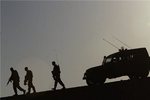
A Palestinian teenager was reported to have been seriously injured, while two others were abducted by Israeli forces near the Kerem Shalom crossing, in the Gaza Strip.
Medical sources said that a 17-year-old Palestinian identified by his initials A.K., was shot by Israeli forces near the crossing and taken to Abu Yusef Najjar hospital in a serious condition.
Witnesses said forces opened fire on three Palestinians who approached the border, injuring one, before the other two were detained.
Earlier Sunday, a Palestinian man was shot dead by Israeli troops in the northern Gaza Strip.
Medical sources said that a 17-year-old Palestinian identified by his initials A.K., was shot by Israeli forces near the crossing and taken to Abu Yusef Najjar hospital in a serious condition.
Witnesses said forces opened fire on three Palestinians who approached the border, injuring one, before the other two were detained.
Earlier Sunday, a Palestinian man was shot dead by Israeli troops in the northern Gaza Strip.
22 nov 2014

Israeli occupation forces (IOF) used live ammo against Palestinian young men staging protest to the north of Gaza Strip on Friday night wounding one of them.
Eyewitnesses said that 22-year-old Ibrahim al-Nimnim was hit with a bullet in his right foot in the vicinity of the Martyrs Cemetery east of Jabaliya, north of Gaza.
Dozens of young men burnt tires and marched to the Gaza border fence and tried to throw stones at the IOF soldiers who opened fire at them, the eyewitnesses added.
They said that the young man was hospitalized in moderate condition.
Meanwhile, IOF soldiers detained two young men after crossing the southern areas of the Gaza border fence on Friday night.
Walla Hebrew website said that the two youths were unarmed and were taken for investigation.
The Israeli army has arrested 15 Palestinians since the start of October 2014 after infiltrating into 1948 occupied lands searching for jobs in light of the worsening economic conditions in the besieged Strip.
Eyewitnesses said that 22-year-old Ibrahim al-Nimnim was hit with a bullet in his right foot in the vicinity of the Martyrs Cemetery east of Jabaliya, north of Gaza.
Dozens of young men burnt tires and marched to the Gaza border fence and tried to throw stones at the IOF soldiers who opened fire at them, the eyewitnesses added.
They said that the young man was hospitalized in moderate condition.
Meanwhile, IOF soldiers detained two young men after crossing the southern areas of the Gaza border fence on Friday night.
Walla Hebrew website said that the two youths were unarmed and were taken for investigation.
The Israeli army has arrested 15 Palestinians since the start of October 2014 after infiltrating into 1948 occupied lands searching for jobs in light of the worsening economic conditions in the besieged Strip.
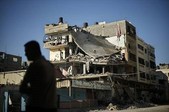
UN Special Coordinator for the Middle East Peace Process, Robert Serry, announced in a statement Friday that under the trilateral agreement between Israel, the Palestinian government and the United Nations reached in September, additional required building materials will reach Gaza soon.
“A further understanding was reached between the parties that starting next week some 25,000 home owners in Gaza will be enabled to access building materials for the repair of their damaged homes,” the statement affirmed.
Serry pointed out that the "Government of National Consensus will soon make a separate public announcement on the process for access to the required building materials".
The Special Coordinator added that in the coming weeks all individuals in Gaza in need of building materials will be enabled to access the mechanism if they wish to do so. They will be able to procure the materials to repair or rebuild their properties in the same locations where they were located prior to the conflict.
The Special Coordinator underlined that as part of the understandings reached, materials procured under the mechanism may only be used for their intended purpose and that the United Nations will undertake spot checks to monitor compliance.
The United Nations will undertake every effort to assist the Palestinian Government of National Consensus in its lead role to reconstruct Gaza, including in providing financial support to home owners needing assistance to undertake repairs, according to the statement.
“However, existing resources are not sufficient and the Special Coordinator urges donors to make available as a matter of urgency the pledges made at the Cairo International Conference.”
The Special Coordinator called on all parties concerned to lend their full support to enable the mechanism to operate at the required scale in the interests of the affected population in Gaza.
According to UN estimates cited in a report, 110,000 people were living in emergency shelters and approximately 108,000 had been left homeless during Israel's 51-day assault on the besieged Gaza Strip this summer.
“A further understanding was reached between the parties that starting next week some 25,000 home owners in Gaza will be enabled to access building materials for the repair of their damaged homes,” the statement affirmed.
Serry pointed out that the "Government of National Consensus will soon make a separate public announcement on the process for access to the required building materials".
The Special Coordinator added that in the coming weeks all individuals in Gaza in need of building materials will be enabled to access the mechanism if they wish to do so. They will be able to procure the materials to repair or rebuild their properties in the same locations where they were located prior to the conflict.
The Special Coordinator underlined that as part of the understandings reached, materials procured under the mechanism may only be used for their intended purpose and that the United Nations will undertake spot checks to monitor compliance.
The United Nations will undertake every effort to assist the Palestinian Government of National Consensus in its lead role to reconstruct Gaza, including in providing financial support to home owners needing assistance to undertake repairs, according to the statement.
“However, existing resources are not sufficient and the Special Coordinator urges donors to make available as a matter of urgency the pledges made at the Cairo International Conference.”
The Special Coordinator called on all parties concerned to lend their full support to enable the mechanism to operate at the required scale in the interests of the affected population in Gaza.
According to UN estimates cited in a report, 110,000 people were living in emergency shelters and approximately 108,000 had been left homeless during Israel's 51-day assault on the besieged Gaza Strip this summer.
20 nov 2014

The Gaza-based Health Ministry Wednesday launched distress signals over an imminent health crisis to rock the Gaza Strip, dubbing the situation tragic and quite unbearable.
Spokesman for the Health Ministry, Dr. Ashraf al-Qudra, said in a press conference held in al-Shifa Hospital on Wednesday afternoon: “Cleaning companies have been on strike for the third day in protest at unpaid salaries.”
“The situation bodes ill. An anticipated health crisis is going to sweep Gaza hospitals and patients,” he further warned.
Al-Qudra spoke out against the acute shortages in fuel reserves needed to run power generators.
Nutrition companies stopped providing meals to patients at al-Shifa complex due to unpaid financial dues, he added.
Al-Qudra said despite current efforts to tone down the crisis, things went beyond the control of Gazans.
He appealed to the unity government to live up to its allotted mission and to immediately step in so as to assuage the agony of thousands of patients in the blockaded enclave.
He called on the international community and local institutions to urgently intervene, work seriously on lifting the siege, and open the border-crossing to smooth patients’ access out of and into Gaza to receive urgent treatment.
The Palestinian unity government has been dragging its feet vis-à-vis the Gaza health and salary crises ever since it took over some six months ago.
Spokesman for the Health Ministry, Dr. Ashraf al-Qudra, said in a press conference held in al-Shifa Hospital on Wednesday afternoon: “Cleaning companies have been on strike for the third day in protest at unpaid salaries.”
“The situation bodes ill. An anticipated health crisis is going to sweep Gaza hospitals and patients,” he further warned.
Al-Qudra spoke out against the acute shortages in fuel reserves needed to run power generators.
Nutrition companies stopped providing meals to patients at al-Shifa complex due to unpaid financial dues, he added.
Al-Qudra said despite current efforts to tone down the crisis, things went beyond the control of Gazans.
He appealed to the unity government to live up to its allotted mission and to immediately step in so as to assuage the agony of thousands of patients in the blockaded enclave.
He called on the international community and local institutions to urgently intervene, work seriously on lifting the siege, and open the border-crossing to smooth patients’ access out of and into Gaza to receive urgent treatment.
The Palestinian unity government has been dragging its feet vis-à-vis the Gaza health and salary crises ever since it took over some six months ago.
Page: 143 - 142 - 141 - 140 - 139 - 138 - 137 - 136 - 135 - 134 - 133 - 132 - 131 - 130 - 129 - 128 - 127
Truce violations List of names Pictures of martyrs
Days: Aug: 26 - 25 - 24 - 23 - 22 - 21 - 20 - 19 - 18 - 17 - 16 - 15 - 14 - 13 - 12 - 11 - 10 - 9 - 8 - 7 - 6 - 5 - 4 - 3 - 2 - 1
July: 31 - 30 - 29 - 28 - 27 - 26 - 25 - 24 - 23 - 22 - 21 - 20 - 19 - 18 - 17 - 16 - 15 - 14 - 13 - 12 - 11 - 10 - 9 - 8
